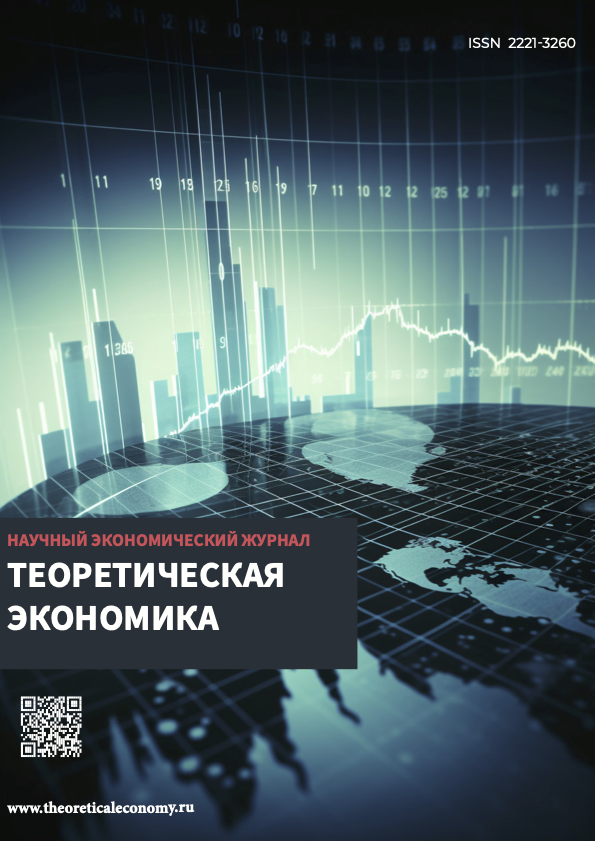Kirov, Kirov, Russian Federation
Kirov, Kirov, Russian Federation
Kirov, Kirov, Russian Federation
Kirov, Kirov, Russian Federation
The modern view of the development of economic theory contains a sufficient number of different approaches and trends. Orthodox economics (economic mainstream) and heterodox economics (unorthodox, alternative economy) are among the "opposing" trends. The purpose of the study is to study the conceptual provisions of heterodox thought of economics. To achieve this goal, the team of authors used general scientific methods. The study of heterodox economics was carried out by domestic and foreign economic scientists. Within the framework of this scientific article, approaches to the definition of heterodox economics, economic trends in this current were identified. Methodological pluralism, a certain role of a person in society, the use of meso-foundations, the role of the historical process in economic development, and interdisciplinary integration were determined by the features of the economic under consideration. At the same time, the development of an unorthodox economy is affected by the problems associated with the concentration of economists on countering the economic mainstream without participating in the development of their own economic direction, as well as an insufficient level of international integration.
economic theory; heterodox economics; orthodox economics; economic mainstream; development of economic thought
1. Krugman P. How Did Economists Get it so Wrong? URL: https://www.nytimes.com/2009/09/06/magazine/06Economic-t.html?smid=url-share (data obrascheniya: 20.02.2023).
2. Romer P. The Trouble with Macroeconomics. URL: https://paulromer.net/the-trouble-with-macro/WP-Trouble.pdf (data obrascheniya: 20.02.2023).
3. Piketty T. Capital in the Twenty-First Century. – Moscow: Ad Marginem Press, 2015 – 592 s.
4. Kirdina S. G. Rol' institutov i geografii v ekonomicheskom razvitii: aktual'naya polemika v geterodoksal'noy ekonomike // Prostranstvennaya ekonomika. – 2016. – № 3. –S. 133-150.
5. Bazhenov G. A., Mal'cev A. A. Sovremennye geterodoksal'nye napravleniya ekonomicheskoy teorii v kontekste transformacii meynstrima // Obschestvo i ekonomika. – 2018. – Vyp. 1. – S. 5-21.
6. Kirdina-Chendler S. G. «Institucional'nyy sintez» v ekonomicheskoy teorii: proshloe, nastoyaschee ili buduschee? // Institucional'naya transformaciya ekonomiki: chelovek i socium (ITE-ChS 2021): materialy VII Mezhdunarodnoy nauchnoy konferencii, Tomsk, 21-23 oktyabrya 2021 g. Tomsk. – 2021. – S. 81
7. Kirdina-Chendler S. G. Mezoekonomika i ekonomika slozhnosti: aktual'nyy vyhod za predely ortodoksii // Journal of Institutional Studies. – 2018. – T.10. – № 3. – S. 6-17.
8. Kul'kov V. M. Geterodoksal'naya teoriya: rol' v issledovanii ekonomiki // Filosofiya hozyaystva. – 2021. – № 5. –S. 59-68.
9. Mal'cev A. A. Geterodoksal'naya ekonomicheskaya teoriya: tekuschee sostoyanie i puti dal'neyshego razvitiya // Ekonomicheskaya politika. – 2018. – T. 13. – №. 2. – S. 148-169.
10. Mal'cev A. A. Sovremennaya ekonomicheskaya nauka: na puti ot ortodoksii k plyuralizmu // XI Mezhdunarodnaya konferenciya «Rossiyskie regiony v fokuse peremen». Ekaterinburg, 17-19 noyabrya 2016 g.: sbornik dokladov. – Ekaterinburg: Izdatel'stvo UMC UPI, 2016. – Ch. 2. – S. 1147-1154.
11. Barashkova O. V., Buzgalin A. V., Pavlov M. Yu., Filatov I. V. A. I. Moskovskiy: ob institucionalizme // Vestnik Moskovskogo universiteta. Seriya 6. Ekonomika. – 2022. – №6. – S.251-271. – DOIhttps://doi.org/10.38050/013001052022611.
12. Sindzingre A. N. Prichinnost', modelirovanie i social'nye normy: ih mesto v teoreticheskom yadre geterodoksnoy ekonomiki // Zhurnal institucional'nyh issledovaniy. – 2018. – T. 10. – № 4. – S. 20-37. – DOIhttps://doi.org/10.17835/2076-6297.2018.10.4.020-037.
13. Colander D. Moving Beyond the Rhetoric of Pluralism: Suggestions for an «Inside-the-Mainstream» Heterodoxy // Economic Pluralism / R. Garnett, E. K. Olsen, M. Starr (eds.). – London, New York: Routledge, 2009. – pp. 36–47.
14. Davis J. B. Heterodox Economics, the Fragmentation of the Mainstream, and Embedded Individual Analysis // Future Directions for Heterodox Economics. – Ann Arbor: University of Michigan Press, 2008. – pp. 53–72.
15. Dzarasov R. Post Keynesian Investment and Pricing Theory: Contributions of Alfred S. Eichner and Frederic S. Lee // Advancing the Frontiers of Heterodox Economics: Essays in Honor of Frederic S. Lee / T.-H. Jo, Z. Todorova (eds.). – London, New York: Routledge, 2015. – pp. 135-153
16. Rutherford M. Institutional Economics: Then and Now // Journal of Economic Perspectives. – 2001. – Vol. 15. – No 1. – P. 173–194.
17. Thornton T. B. From Economics to Political Economy: The Problems, Promises and Solutions of Pluralist Economics. – London, New York: Routledge, 2016. – 240 r.
18. Rozmainskiy I. V. Vvedenie v postkeynsianstvo // Idei i idealy. – 2010. – № 1. – S. 88-105.
19. Akademicheskie bar'ery: problema izolyacii akademicheskih soobschestv v Rossii. URL: https://www.hse.ru/data/2015/06/24/1083743591/AF_15.pdf (data obrascheniya: 20.02.2023).
20. Yadgarov Ya. S. Preodolenie ortodoksii v ekonomicheskoy nauke XX stoletiya v kontekste novovvedeniy institucionalizma i neoklassicizma // Istoriko-ekonomicheskie issledovaniya. – 2014. – T. 15. – № 3. – S. 439–463.
 This work is licensed under Creative Commons Attribution-NonCommercial-NoDerivatives 4.0 International
This work is licensed under Creative Commons Attribution-NonCommercial-NoDerivatives 4.0 International












